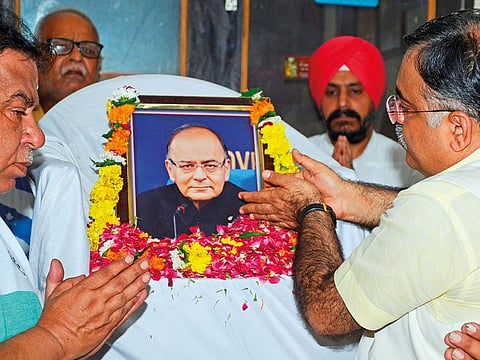Arun Jaitley leaves behind a rich and chequered legacy
Tributes pour in from politicians across party lines

New Delhi: After it returned to power with a thumping majority this May, the exhilaration of having achieved 303 seats dimmed slightly for the BJP with Arun Jaitley’s announcement that he would not be a part of the Narendra Modi government. The party’s chief troubleshooter opted out of active office due to poor health.
Yesterday, former Indian finance minister Arun Jaitley died in hospital in New Delhi aged 66, the government said.
He was admitted to the hospital two weeks ago after he complained of breathlessness and restlessness.
Jaitley was diabetic and had bariatric surgery in 2014, received a kidney transplant in 2018 and travelled to the United States last January for unspecified medical care.
He is survived by his wife, son and daughter.
Modi said on Twitter that Jaitley “was a political giant, towering intellectual and legal luminary. He was an articulate leader who made a lasting contribution to India.”
Indian President Ram Nath Kovind said he was extremely saddened by the news. “A brilliant lawyer, a seasoned parliamentarian, and a distinguished minister, he contributed immensely to nation building,” he tweeted.
Serving from 2014 until elections earlier this year, Jaitley oversaw the sudden withdrawal of vast amounts of cash from circulation in 2016.
Modi said the controversial policy, known as “demonetisation”, would bring the black economy out of the shadows but it caused huge disruption and eventually almost all notes were returned to the banking system.
A lawyer-turned-politician, Jaitley was also in office for the introduction of a new nationwide goods and services tax (GST), which was better received despite teething problems.
Leaders across party lines condoled Jaitley’s death.
Bharatiya Janata Party President Amit Shah, who cut short a trip to come back to the national capital after the news broke of Jaitley’s death, called it a ‘personal loss’. Shah called him ‘not only a senior leader of the party but a part of the family’.
Manipur Governor Najma Heptullah fondly remembered him not only as a former cabinet colleague but also as a legal luminary; “He could speak very well not only on the floor of the House but also inside the courtroom”. She remembered the humour that Jaitley would inject into his parliamentary speeches.
Top Congress leaders condoled the death of Jaitley, with party chief Sonia Gandhi saying his contributions to public life will be remembered forever.
She said Jaitley had a long innings as a public figure, parliamentarian and minister
Former president Pranab Mukherjee said he had visited him a day back and had prayed for his speedy recovery.
“He was a leader with deep intellect and knowledge, and a voice of reason. He will be dearly missed. My prayers with his family, friends and admirers,” he said.
The Congress party said, “We are deeply saddened to hear the passing of Shri Arun Jaitley. Our condolences to his family. Our thoughts and prayers are with them in this time of grief,” the Congress said.
The party’s chief spokesperson Randeep Surjewala said: “Saddened to know about the demise of Shri Arun Jaitley. My deepest condolences to his family. An astute parliamentarian, he’ll always be remembered. May his soul rest in peace.”
Senior Congress leader Ahmad Patel said in Jaitley the nation has a lost an articulate leader and an excellent human being.
Noted lawyer and former union minister Kapil Sibal said he has lost an old friend.
Jaitley was undoubtedly one of the BJP’s most prominent leaders, besides being the Finance Minister during the first term of its government between 2014 and 2019. He leaves behind a rich and chequered legacy, one where his tenure as the Finance Minister is marked with bold reforms, including some of the most far-reaching since Independence, as well as the notorious ‘demonetisation’ that dealt the hardest blow to the country’s masses.
He is credited with ushering India into the league of the world’s fastest growing economies, ahead of mighty China. India remained in that slot till the last quarter of the last fiscal, though the government on year basis maintains it is still the fastest growing economy.
Jaitley also managed to control inflation — bringing it down from 7.2 per cent to 2.9 per cent. He showed a path of fiscal prudence and fiscal deficit was brought down to 4.1 per cent in 2014-15, to 3.9 per cent in 2015-16, to 3.5 per cent in 2016-17, to 3.53 per cent in 2017-18 and 3.4 per cent in the last fiscal.
The Goods and Services Tax (GST) regime and the Insolvency and Bankruptcy Code (IBC) were implemented during his tenure, even though the GST wasn’t exactly a BJP brainchild.
Jaitley had opposed it when the UPA government first introduced it during its last term. But he succeeded in implementing the tax reform with a federal democratic structure and an equal voice of the states, including that of the non-BJP-ruled states, something the UPA found hard to achieve. After initial teething troubles, the tax reform has some what settled now.
His tenure also saw the initiation of consolidation of state-run banks. Five associated banks and the Bharatiya Mahila Bank merged with the State Bank of India (SBI), while Dena Bank and Vijaya Bank merged with Bank of Baroda to create a larger entity.
Then there were FDI reforms. While the defence, insurance and aviation sectors were opened to higher FDI, many others were thrown open to the automatic route cutting down delays. The archaic Foreign Investment Promotion Board (FIPB), one of the remnants of the bureaucratic set-up, was abolished. FDI inflows shot up to over $44 billion (Dh161.5 billion) from $23.8 billion.
Sign up for the Daily Briefing
Get the latest news and updates straight to your inbox



